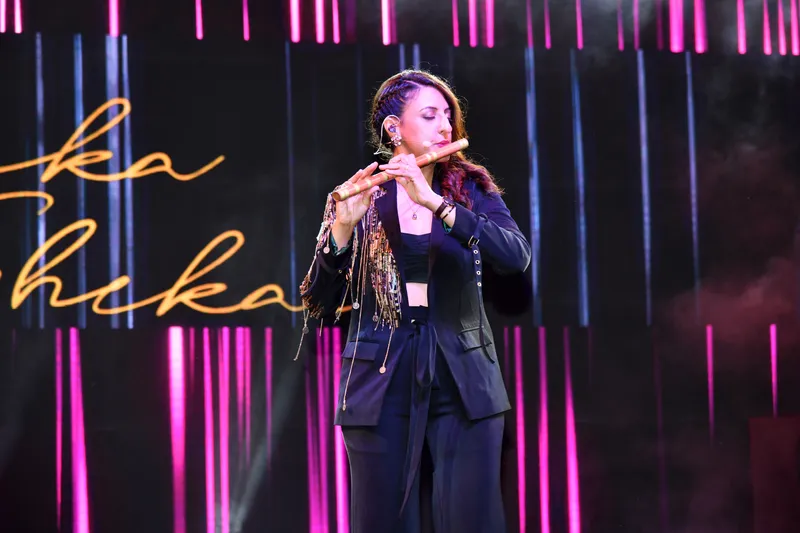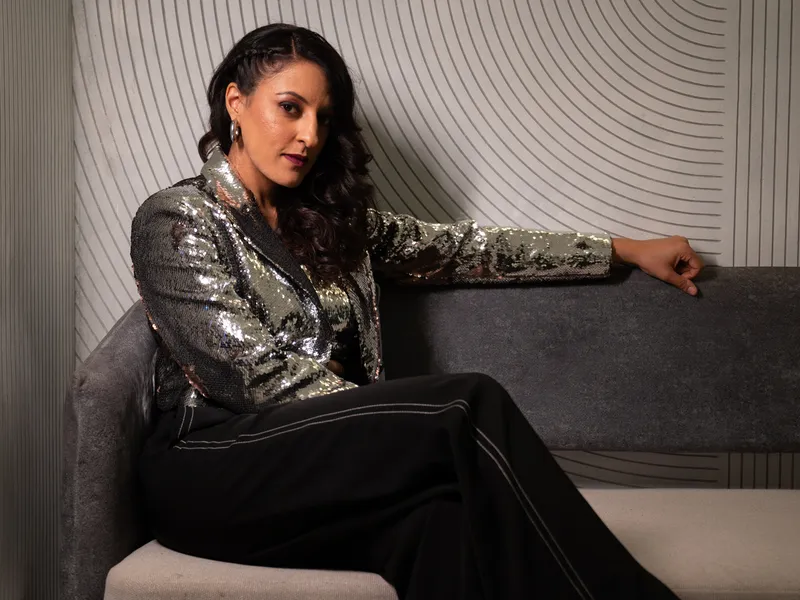Indo-American flautist and vocalist Rasika Shekar on her musical odyssey
Celebrated vocalist and flautist Rasika Shekar’s first playback singing experience was for the movie Dekh Indian Circus, which was composed by Shankar-Ehsaan-Loy. She has also lent her voice to movies like 2 States and Kill Dill.
Growing up in a Tamilian household, where art and culture held deep meaning, singer, flautist, and composer Rasika Shekar’s childhood was interspersed with training in classical music. Little did she know that a ‘hobby’ would eventually turn into a profession.
Born in Dubai and raised in New Jersey, Shekar found a companion in music and wanted to dig deeper into her roots. Ever since she professionally performed in 2011 as a vocalist—on a tour in the US with Ustad Ghulam Ali Khan—there’s been no looking back.
Shekar got a break in playback singing by Shankar Mahadevan for the movie Dekh Indian Circus, the music of which was composed by Shankar-Ehsaan-Loy. Later, she went on to lend her voice to movies like 2 States and Kill Dill.

The turning point in her career arrived with a performance in MTV Coke Studio Season 2 as a flautist on Ehsaan and Loy’s production single, Man Patang.
Shekar has performed at various independent and folk music festivals across the world, including Iceland, Kuwait, Bahamas, Dubai, and more.
She also pursued jazz and flamenco music at Berklee College of Music in Valencia, Spain.
In a freewheeling chat with YS Life, Shekar opens up about her musical journey, sharing some of the milestones and high points that have defined her career.
Edited excerpts from the interview:
YS Life (YSL): How did you cultivate interest in music?
Rasika Shekar (RS): As someone who comes from a Tam-Brahm family, learning an art form is highly encouraged without a specific goal of making it professional. I was put into vocals as a child.
My family moved to the US from Dubai when I was 12, and that’s when I started studying the Carnatic flute and diving deep into the tradition of Carnatic music. It was nice, but I didn’t think much of it at that point.
When I was studying to become a Chemical Engineer at Rutgers University in New Jersey—in my third year, I realised I felt attached to it much more than a hobby. It was a companion to me, something that really felt like home.
That’s when I started understanding that I can’t ignore music. I wanted to dig deeper into it.
YSL: Brief us about your professional journey in music.
RS: I moved to India in 2010 to study classical music. I was then introduced to Srikant Vaikar. He didn’t have any slots but I really pestered him, and one day he heard me sing and said he’s going to make time for me! I was so enamoured by him and wanted him to teach me.
Thereafter, my musical career began in 2011 with a vocal ghazal performance tour with Ustad Ghulam Ali Khan. Someone known to him had seen me at another local concert and that’s how I got invited! It was a surreal experience performing with a legend, and opening up before a multicultural audience. We were also doing ghazals, it was quite challenging to understand the improvisation in the language.
I continue to dabble between being an artist and a performer—it’s two different worlds. But I really enjoy connecting with the audience and seeing a smile on their faces—it’s really precious!

Enjoy Enjaami controversy: AR Rahman says he was only mentor to Maajja team, received no financial benefit
YSL: How did you get a break in playback singing?
RS: When I came to India, I had the good fortune of meeting Shankar Mahadevan. He asked me to come to a studio where Ehsaan and Loy were also present. I had three minutes during which I sang three songs! He asked me to work with him on a Rajasthani-themed playback song called Lambuda Kakka.
After that, I worked with the trio on several films including 2 States, Katti Batti, and Kill Dill. I also toured with them in Mumbai, Dubai, and the US as a lead singer.
YSL: How did you begin performing as a professional flautist?
RS: Initially, no one knew I could play the flute. I was essentially doing Carnatic concerts and playing classical music. I was touring as a vocalist with Shankar-Ehsaan-Loy and some chat came up, when they discovered this side of me. They asked me to play a small section in one of their concerts. And when I did that, one of the videos went viral.
YSL: And then Coke Studio Season 2 happened...
RS: It was a specific flute feature and in a very different domain. It was a folk song called Man Patang and I was featured on Shankar-Ehsaan-Loy’s episode.
Folk music requires a certain approach and I really had to sit with it and figure out what I could really do with the flute in the concert.
It wasn’t about me being a classical musician at that point. It was about me knowing how to add colour as a flautist to their track. It was the first time I thought of the instrument very differently. That time I was a bit nervous, it was a challenge.s
YSL: You were also recently a part of the musical documentary called Equals. How was the experience?
RS: Anahad Foundation (producer) works for the recognition and preservation and evolution of cultural, classical, and folk music in India. Through Equals, the idea was to pair a folk artist with an urban producer. In the series, I collaborated with the most senior and legendary folk artist Prahlad Tipanya who performs Kabir Bhajans. It was one of the most enriching and exciting projects I have been a part of.
As a producer, one has to take the responsibility of putting a piece together, or bringing different musical ideas and backgrounds in the most honest and hybrid way. When you deal with folk music, there's a certain level of sensitivity because you are dealing with something that has existed for ages.
YSL: What’s next in the pipeline?
RS: A devotional piece called Shiva Tandav Stotram just released. I have grown up listening to it. In this piece, the instrumental bit as well as the chants are equally important. What one can offer instrumentally is different from what one can offer vocally, and vice versa.
There are also three to four songs that will be out in the next few weeks, which I composed during my time at a prestigious music residency in Banff, Calgary, Canada very recently. I was in an isolated cabin in the middle of a valley! I went on to compose music that’s unfiltered; I was not being driven by any cerebral labels. It was a meditative and spiritual experience in many ways.
Edited by Megha Reddy







